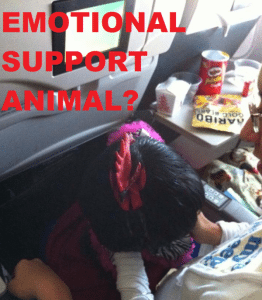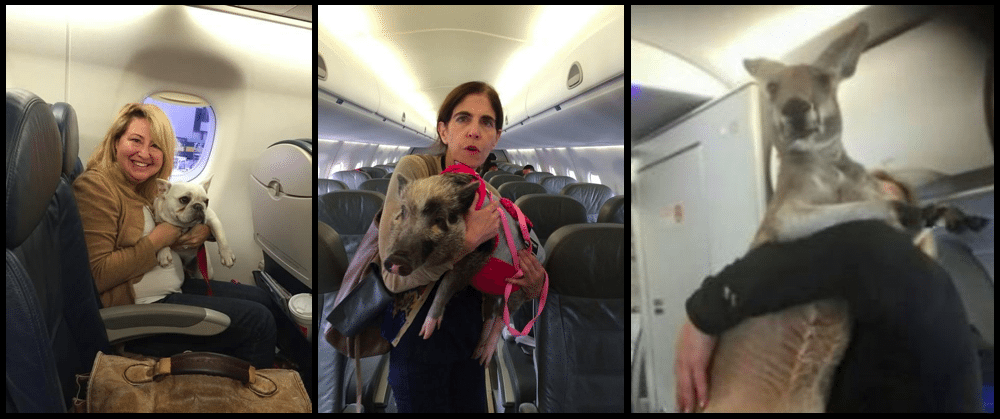
Emotional Support Pets: Real or Fake?

Current Events –
Emotional Support Pets: Real or Fake?
There’s a growing phenomenon in the travel industry: Emotional Support Pets. Are these real or fake?
Travel blogger Alyssa Ramos, 27, is preparing for a holiday trip to Fort Lauderdale, FL, and she has her system down. In addition to 1 wheelie, she has a carrying bag for her 7-pound Pomeranian — Oscar de la Ramos — and a knapsack filled with toys and treats to keep his ears from popping. Unlike other dogs that are only allowed to travel zipped in bags and stowed under a seat, Oscar is Ramos’ emotional support animal, which allows the dog to cuddle with her during takeoff.

Current Events
Interestingly, Ramos is among a growing number of travelers who have misused the Air Carrier Access Act to have pet dogs, pet pigs and even miniature horses deemed “necessary” to their emotional well-being. How is this possible???
Originally, emotional support pets were meant for those who could barely function without the support of an animal. However, travelers have learned how to con the system to allow their favorite pet to travel inside the cabin with them — completely avoiding the cost of shipping the pet beneath the plane along with the rest of the animals.
A simple note purchased from any doctor on the Internet, certifying that an emotional support pet is necessary (the operative word) for the well-being of the traveler is all it takes to turn a First Class cabin into Old McDonald’s farm.
“A guy had a miniature horse, which didn’t fit comfortably in the back, so he was put in first class,” said Eric Lipp, executive director of Open Doors Organization, an advocacy group for people traveling with disabilities. “The airline made the horse wear these little shoes so it didn’t scuff the plane, but it pooped all over and the other first-class travelers weren’t happy.”
Passenger who become angry when they see a horse roaming the aisles of an aircraft are certainly warranted — particularly when a traveler is merely gaming the airline and making it much more difficult for those who do need an honest to goodness emotional support pet.
“The people who really need support animals despise people who fake it,’’ says Lipp. “I call it ‘the Paris Hilton effect,’ where people want to take their cute little dogs everywhere.”
However, certain pet owners have convinced themselves that high prices and a stressful travel environment justifies their bending the rules for “Fluffy” to ride in style with them.
“I first applied for support papers online to avoid the airline pet fee,” Ramos admitted. “But I had just gotten into a motorcycle accident and had emotional stress, so my regular doctor wound up writing me a letter.”
.

.
Current Events
The process to have an animal classified as an emotional support pet is amazingly simple: an owner only needs to obtain a note from a licensed mental health professional such as a psychologist, psychiatrist or social worker. These “doctors” have caught on to the enormous cash cow such notes provides and now, countless sites provide emotional support letters for anywhere from $59 to $200. In fact, an in person visit or actual examination of the traveler is not required. Once a traveler presents their “doctor’s note,” airlines are quick to comply, since fines for refusing legitimate emotional support pets can run as high as $150,000.
 “The more people are learning about this, the more they are trying to take advantage of the system. We are helping the ones we think need it,’’ says Steven Laroid, who provides the necessary notes via the website animalcompanions.org. His site has 7 licensed psychologists who evaluate applicants via Skype, then provide letters for those
“The more people are learning about this, the more they are trying to take advantage of the system. We are helping the ones we think need it,’’ says Steven Laroid, who provides the necessary notes via the website animalcompanions.org. His site has 7 licensed psychologists who evaluate applicants via Skype, then provide letters for those they deem in need of support animals who pay the $179 fee. According to Laroid, he gets about 200 requests per month, which is an increase of 25% since he founded the site in 2013.
As more travelers catch on to the online letter game, emotional support pets have grown completely out of hand.
“A man once insisted that his emotional support monkey needed an emotional support bird,’’ said Lipp. “We have seen multiple people want bunny rabbits. One woman said she needed 5 of them, and the airline finally let her keep 1 in the cabin and waived the fee for the others, but made them ride in cargo.”
Lipp remembered a woman from last December, who had to deplane a US Airways flight when her pot-bellied pig became disruptive. He also reminisced about a time prior to 2008, when arachnids and reptiles were actually allowed onboard as emotional support animals.
“We had a woman who had an emotional support tarantula, and I actually believed her. She had a lot of anxiety over takeoffs and landings, and tarantulas require a lot of focus, which took her mind off the problem, but it terrified passengers.,” Lipp said.

Behavioral psychologist Dr. Steve Josephson is all for emotional support pets — for those who actually need it. “This is a safe, side-effect free way to get people to overcome their anxiety,’’ he said. However, how can an airline decipher if the pet rat or pet pig being brought onto a plane is for real or for fake?
Jason Clampet, co-founder of the travel site Skift, says pretending to be emotionally disabled is selfish. “This is a work-around for people who are self-centered and don’t want to pay a fee and are willing to lie.’’
However, Anthony Berklich, founder of the travel site Inspired Citizen believes that travelers who bend the rules a bit are justified.
“Emotional Service Animals are a wonderful service that airlines allow,” he says, “and consumers who are being nickeled- and-dimed for every little thing don’t feel badly about getting through the system.”
Hmmm…tell that to those travelers who are authentically emotionally disabled and in actual need of an emotional support pet.






LOL ok the kangaroo got me. People do some crazy things.